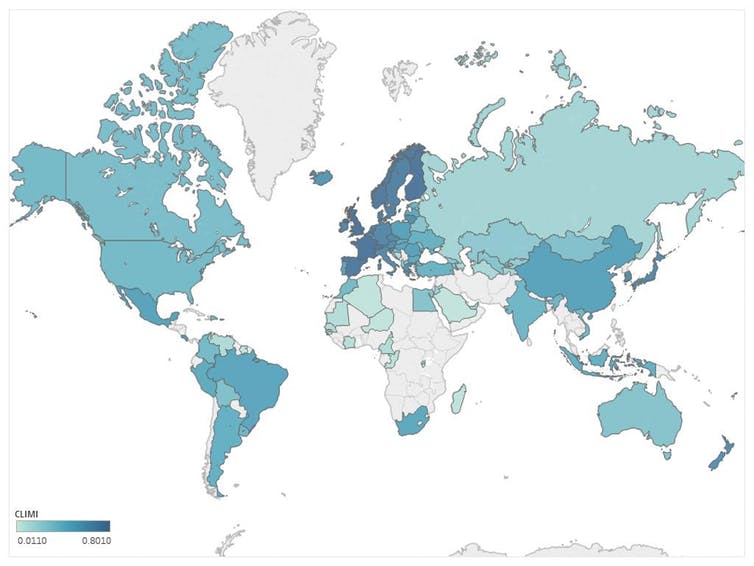Does the language we speak influence how much we care about the environment? Our new research suggests that the answer is yes.
Speakers of languages without a distinct future tense, such as Finnish, care more about the environment than speakers of languages with future tense marking, such as French or English. Their respective countries also have stricter climate change policies.
This is surprising. You might suppose that different languages are just different ways of encoding the same information. Surely when an English speaker says “It will snow tomorrow” and a German speaker says “Es schneit morgen”, they are saying exactly the same thing. Why should it matter which symbols we use?
The answer may lie in the fact that language is deeply intertwined with culture and reflects an entire way of perceiving the world, a so-called Weltanschauung (world view). This view goes back to the German Romantics, and was later popularised by the linguist Benjamin Whorf.
The Whorfian view of language was for a long time met with suspicion by linguists and cognitive scientists. But it has recently experienced a resurgence. Excitingly, it has now reached other sciences, such as economics.
Whether languages come with their own world view is an elusive question that has been the springboard for more concrete concerns from economists: does language influence tangible outcomes like saving rates or the representation of women in the labour market? Again, the answer seems to be yes.
Our research shows that the way in which a language refers to the future has a bearing on environmental behaviour and policies.
Being present
Some languages, such as Finnish or German, don’t require speakers to talk about the future in a distinct way. Rather than saying “We shall go to the movies tomorrow”, they treat tomorrow as if it were today: “We go to the movies tomorrow.”
These languages are described as “present-tensed”. (True, German is able to mark the difference with the auxiliary verb “werden”, but it isn’t obligatory and sounds artificial in everyday conversation.)
On the other side are languages, such as English or French, that do require a distinct future tense marking. These are called “future-tensed” languages.
Our research, published in the Journal of Comparative Economics, shows that speakers of present-tensed languages are more likely to engage in green behaviour.
According to our estimates, a change from a present- to a future-tensed language results in a 20% decrease in an individual’s propensity to help safeguard the environment. What’s more, speakers of future-tensed languages are 24% less willing to pay higher taxes to fund environmental policies. These estimates are based on the World Values Surveys, a collection of nationally representative, individual-level surveys conducted in nearly 100 countries.
A similar effect can be seen at the national level. Countries that speak a present-tensed language generally have stricter climate change policies.
This becomes clear by comparing countries’ scores on the CLIM index, which assesses the level of international co-operation, domestic legal frameworks, and fiscal and regulatory measures concerning climate change. The maximum score is 1, the minimum 0, and a higher value indicates stricter climate change policies.

While it is true that the UK, a country with a future-tensed language, has the highest CLIM index score, other future-tensed countries (such as the United States and Australia) score 15% lower on average than present-tensed ones.
If we allow ourselves to use a hypothetical example, this suggests that if Greece were to switch from a future- to a present-tensed language, the stringency of its climate change policies would be at the level of Sweden.
What’s the explanation for this?
There are two potential mechanisms by which these effects might arise.
First, it may be that language merely reflects these societies’ underlying cultures. Put simply, some cultures care more about the future, and these cultures may also be more likely to speak a present-tensed language (which treats the future in the same way as today).
The second possibility is that language may itself influence our thinking and behaviour. Talking about the future as if it were today might make the future feel closer. Humans have a known tendency to “discount” the future – we’d rather have $100 today than in a year’s time.
So by making the future seem closer, present-tensed languages might make people care more about it. This in turn might make them more willing to bear present costs, such as higher prices for green products, for the sake of future benefits like avoiding climate change.
It’s also possible that both mechanisms work together: language might serve as a cultural marker, and at the same time shape our behaviour too. Indeed, there is evidence that this is the case.
Our results may have practical implications. In the short term, it seems unlikely that countries will eliminate the future tense from their language. But there may be other opportunities.
For instance, environmental campaigns in future-tensed countries might try to counteract the linguistic effect of future tense and portray the dangers of climate change as particularly urgent and pressing. And when deliberating about investing in otherwise similar countries, international organisations might decide that their investment has a better payoff in present-tensed countries.
Finally, we might even suggest that international climate negotiations should be conducted exclusively in Finnish – although we might be waiting a while for everyone to catch up. (This article was originally published on The Conversation. Read the original article.)

